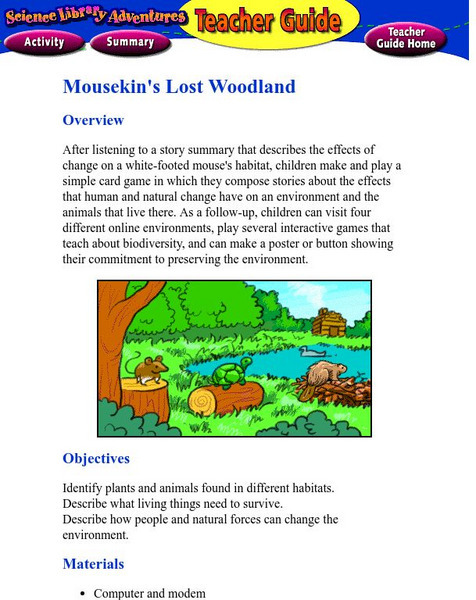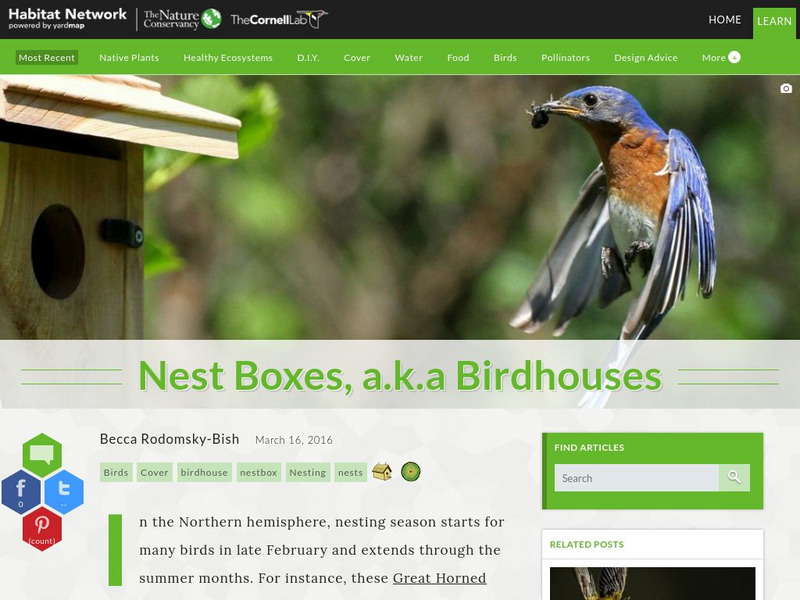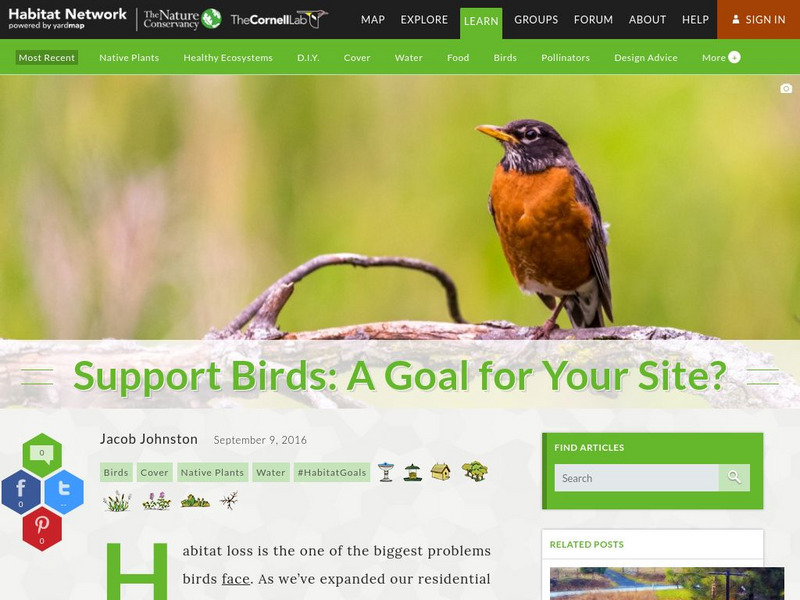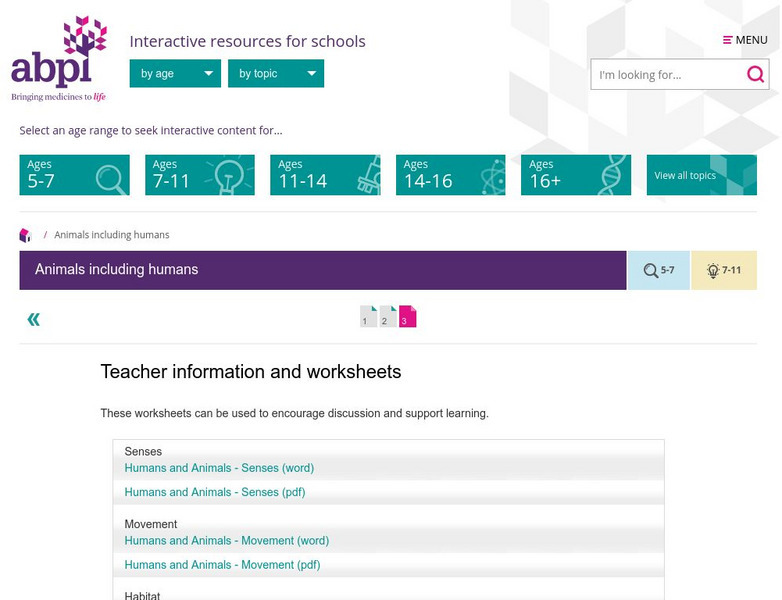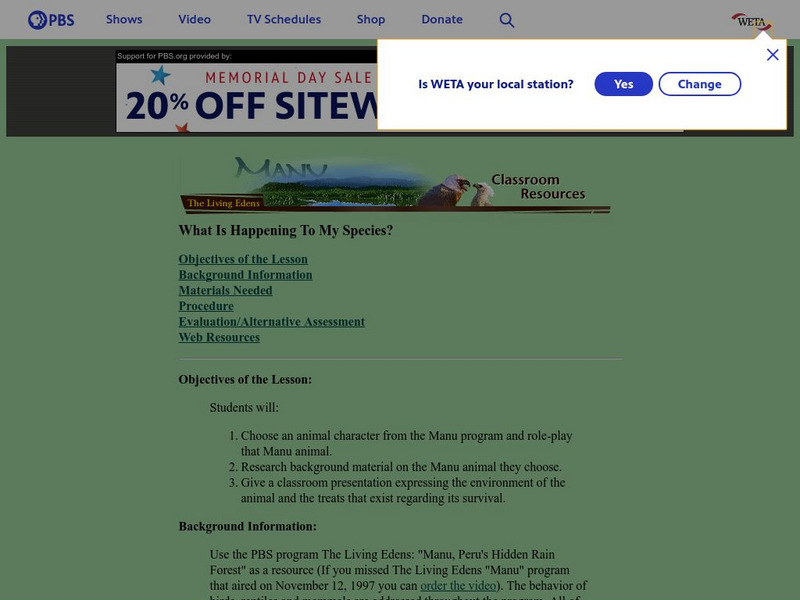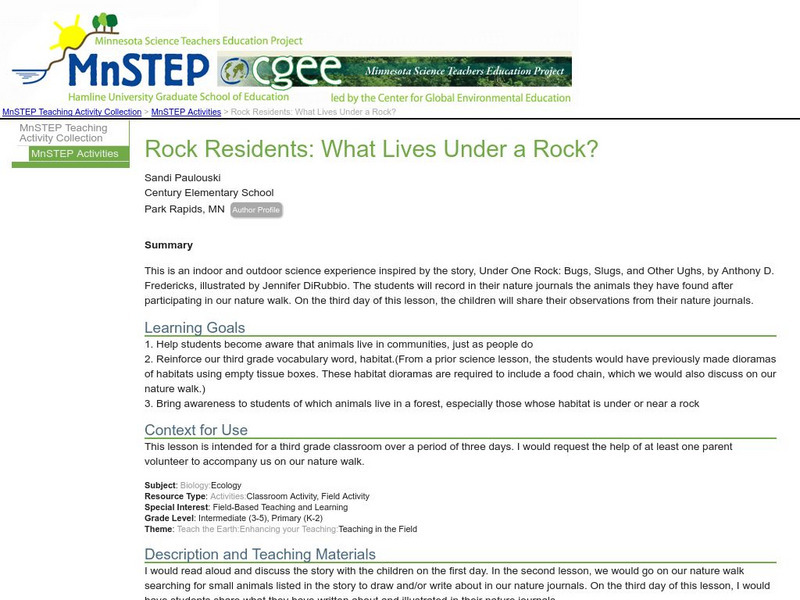University of Illinois
University of Illinois Extension: Urban Text: Adventures of Herman the Worm
WORMS- What are they? Where did they come from? If you are interested in Herman the Worm's family tree (biologically speaking), his body structures, or all the facts about him that you'll ever need, go to "The Adventures of Herman the...
Other
Boggle's World Esl: Word Searches
A collection of more than 40 printable word search activities designed for ESL students. Searches are organized by level of difficulty (easy, intermediate to difficult) and cover a wide variety of themes, e.g., colors, verbs, the five...
EL Education
El Education: Local Habitat Survey and Animal Research
Students observe animals in several habitats and then choose one animal to research. Students learn about physical adaptations that help each animal live successfully in its habitat and then draw a picture of their animal which is later...
US Fish and Wildlife Service
U.s. Fish and Wildlife Service: Listed Species Believed to or Known to Occur in Each State
This page was created for quick access to pages that offer the most recent fact sheets, life history, and regulatory information for different animal species. Choose a state in the list to find a listing of animal species, and follow...
Read Works
Read Works: Organizing Information Into an Outline
[Free Registration/Login Required] In this activity, students will take notes as they read Animal Homes by Ann O. Squire. This information will then be organized into an outline. Includes printable materials for teacher and students.
Education Place
Houghton Mifflin: Eduplace: Mousekin's Lost Woodland
This interactive site has "Mousekin's Lost Woodland" environment game. Play this storytelling game with your friends and learn about different habitats.
Alabama Learning Exchange
Alex: Tad the Tadpole
Tad the Tadpole is designed to demonstrate how pollution in various areas affects wildlife in their native habitats. The lesson is designed to stress the importance of conservation for animals and their surrounding environment. Upon...
Cornell Lab of Ornithology
Habitat Network: Nest Boxes, a.k.a Birdhouses
Learn about the importance of bird house boxes in backyard habitats.
Cornell Lab of Ornithology
Habitat Network: Support Birds: A Goal for Your Site?
Find out what citizen scientists can do to provide appropriate habitats for native birds.
PBS
Nh Pbs: Wildlife Journal Jr: In Search of Bats
Follow a bat researcher through the attics and caves of New England to find out what happens when bat habitats dwindle. Learn about the threats bats face, the benefits they provide to our ecosystem, and how we can co-exist.
Alabama Learning Exchange
Alex: Hush Down Under
During this instructional activity young scholars will listen to a read-aloud of Possum Magic, by Mem Fox. Students will then help the teacher search the Internet for Australian connections (animals and habitats). The young scholars will...
Science Buddies
Science Buddies: M&m Survival Challenge
In the wild, there are two types of animals: the hunters and the hunted. A good predator is always on the prowl for fresh prey. What can an animal do to stay off of the menu? Find out how some animals use camouflage, and why sometimes it...
Other
Clemson Cooperative Extension: Cottontail Rabbit Biology and Management
The cottontail rabbit (Sylvilagus floridanus) is one game species familiar to virtually everyone. Its requirements for life are relatively simple and this, coupled with a high reproductive capacity, enables it to hold the title of the...
Science Buddies
Science Buddies: Make a Miniature Habitat
Hands-on lesson plan in which students use mostly natural materials to build a shoebox habitat that mimics a real-life habitat for an animal of their choice.
World Wildlife Fund for Nature
Wwf: Our Earth: Ecoregions: Habitats: Tropical Forests
An introduction and overview of the tropical forest, or rainforest, habitat. Includes a link to information about what lives in a tropical rainforest.
University of Guelph
Invertebrates
Site provides a comprehensive guide to anyone seeking information on invertebrates. Provides links to morphology, biodiversity, ecology and habitats.
PBS
Pbs Kids: Plum Landing: Jungle Jeopardy
Try keeping a whole jungle ecosystem alive by making sure each animal has enough food to survive over a period of 12 days. This game allows players to see how the different species of plants and animals in a rainforest depend on one...
World Wildlife Fund for Nature
World Wildlife Fund Russia
This resource provides bilingual news and facts about wildlife issues and projects across Russia. A small collection of beautiful images and video clips. Special section for kids with puzzles and nature-related games such as Rescue the...
The Association of the British Pharmaceutical Industry
Abpi: Active Science Modules: Humans and Animals Worksheets
Activities to accompany the Active science learning modules.
Other
Covington Independent Public Schools: A Worm Farm
Students will observe firsthand that worms change organic waste into soil. Directions and a cut/paste worksheet are included in this lesson.
TeachEngineering
Teach Engineering: Biodomes
Students explore the biosphere's environments and ecosystems, learning along the way about the plants, animals, resources and natural cycles of our planet. Over the course of lessons 2-6, students use their growing understanding of...
Utah Education Network
Uen: Animals in the Ecosystems
Write about animal contributions to their environment.
PBS
Pbs Teachers:manu: What's Happening to My Species?
Learn about animals from Manu, create a mask depicting a selected animal and role play that animal. Discuss the selected animals and the threats to their survival in the Manu rainforest.
Science Education Resource Center at Carleton College
Serc: Mn Step: Rock Residents: What Lives Under a Rock?
For this activity, students first listen to a story about animals that live under rocks, then go on an exploratory nature walk to see what animals they can find, living in their own small habitats. They write about their discoveries in a...
Other popular searches
- Powerpoint Animal Habitats
- Animal Habitats in Georgia
- Animal Habitats Math Games
- Animal Habitats Kindergarten
- Plant and Animal Habitats
- Lessons on Animal Habitats
- Animal Habitats Adaptation
- Math Animal Habitats
- Animal Habitats and Zoos
- Animal Habitats Bear
- Animal Habitats Webquest
- Australian Animal Habitats





